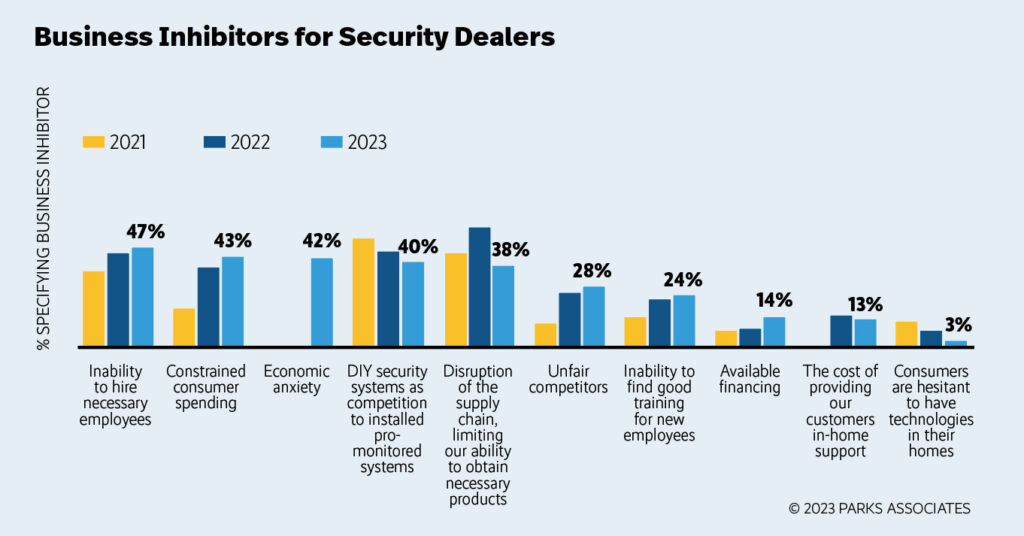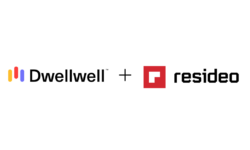Security Industry Forecast: Experts Chime in, Sharing Expectations for 2024 and Beyond
From security industry growth areas to segments that could struggle, our prognosticators share thoughts on how security could transform.

Adobe Stock image by Lukasz
We all like to think that we know what the new year will bring, whether it’s in our personal lives or for our security industry business’ interests.
While most of the predictions we make for the next 12 months will vary wildly from what actually will occur in that time, it’s not out of the realm of possibility that we nail one with a mix of research, education and maybe a little bit of a hunch.
We’ve compiled two dozen of the security industry’s biggest names to find out what they expect the new year to hold. Clip and save these predictions and make sure you congratulate them if they get one or two right–but cut them some slack if they don’t nail all of them!
We know there’s a lot to take in here, but trust us, you’ll learn a whole lot about your industry if you read all the way to the end. There’s a whole lot of wisdom across the security industry and we’re lucky we got some of the best minds to share their thoughts with us here.
Now, on to the predictions!
What technology or solution area do you see as this year’s biggest, ripest growth opportunity for security dealers, installers and integrators?

Matt Barnette
Matt Barnette, CEO of PSA Security: All things cloud, mobile IDs and facial recognition.
Steve Butkovich, chief product officer at CPI Security Systems and president of The Monitoring Association: Video monitoring and video verification are, and will continue to be, two hot areas of expansion in 2024.
Maureen Carlson, co-founder and vice president of growth at System Surveyor: I expect to see more investment in replacing and retrofitting older technologies, such as cable infrastructure, to support the implementation of new technologies, such as power over Ethernet (PoE) lighting or cloud-based access control.
Clint Choate, senior director of security markets at Snap One: Networking products and support.

Mary Clark
Mary Clark, chief marketing officer at Brivo: The ripest growth opportunity lies in embracing the changing landscape of access control technology stacks.
Grant Cowan, director of national accounts at Salient Systems: Twenty-twenty-four needs to be the year that integrators tell manufacturers that we need solutions to unite technologies to provide real solutions for end users.
Peter Giacalone, president of Giacalone Associates LLC: The most impactful and exciting growth will come from presence detection, such as device-specific monitoring and Wi-Fi-sensing technology and AI.
Randy Hall, president at AlarMax: As options for secure and seamless platforms diversify, we see an increasing transition toward IP networking solutions for security, surveillance and AV systems.
Brian James, vice president of sales for ScanSource, Inc.: Most systems today are either not capable [of] or not utilizing the power of analytics, both for security and, more importantly, for business intelligence.

Geoff Kohl
Geoff Kohl, senior director of marketing for Security Industry Association: Intelligent video systems continue to be a hot growth area for the security industry as AI machine learning capabilities empower automation in content analysis.
John Loud, president of 2023 SSI Installer of the Year LOUD Security Systems and chairman of the Electronic Security Association: On the more commercial side, there is proactive video monitoring…. For the residential side, there are water-detection devices that are presenting a great opportunity.
Kirk MacDowell, president of MacGuard Security Advisors: The continued focus and acceptance of remote video monitoring will continue through 2024 and beyond.
John Nemerofsky, COO at SAGE Integration: I see the continued expansion of both counter-drone deployments and weapons detection.
Brandon Niles, senior director of 2022 SSI Installer of the Year Acadian Total Security: The expansion of AI services, especially with the increased availability of smart search features and reidentification, presents significant opportunities for growth and is increasingly accessible.

Elizabeth Parks
Elizabeth Parks, president and CMO at Parks Associates: Smart cameras and video doorbells are popular, showing an increase in adoption and high intentions for the next year…. Bundling these security devices with other useful devices will increase the attractiveness of all devices.
Eddie Reynolds, CEO and president of Iluminar Inc.: I see the rise of AI continuing to accelerate into 2024.
Jeremy White, founder of Pro-Vigil: A tremendous opportunity for growth exists with Software-as-a-Service (SaaS)-type services that dealers, installers and integrators traditionally haven’t had access to.
Which vertical markets are best positioned to deliver increased profitability potential for security businesses this year?
Barnette: Healthcare; education (K-12 and college/university) and critical Infrastructure (utilities, oil and gas, ports and airports).

Steve Butkovich
Butkovich: Commercial market growth and demand will support opportunities for increased profitability in all verticals.
Carlson: We continue to see significant projects and efforts in university and K-12 campuses, as well as in the manufacturing, financial services and retail segments.
Choate: Access control projects and commercial install opportunities remain strong; however, with commercial real estate development slowing or [becoming] stagnant in some areas, integrators should look to keep their options open.
Clark: The retail distribution sector is particularly well positioned.

Grant Cowan
Cowan: There is going to be an explosion of assisted living facilities and other service-oriented housing for the older population.
Angelo Faenza, head of digital access solutions for ASSA ABLOY Opening Solutions Americas: K-12, higher education and healthcare are the vertical markets best positioned to deliver increased profitability in 2024.
Giacalone: With the maturity of remote video monitoring, verification and guarding, I believe [that] the commercial security market is getting ready to explode.
Hall: The fast-growing MDU market presents an excellent opportunity for security businesses in 2024, with a projected increase in MDU construction deliveries and ample demand for technology integrations.
James: SLED (state, local and education), with an emphasis on education, and healthcare will likely be the verticals least affected by the rising interest rates and geopolitical challenges.

Jennifer Kent
Jennifer Kent, vice president of research at Parks Associates: SMBs represent a growth area for security dealers who face increasing competition from DIY security systems and standalone security devices like network cameras and video doorbells.
Kohl: The data center market continues to expand, and these are high-impact projects for our industry because they typically require a variety of high-quality security systems — not only video and access control but [also] intrusion detection and layers of perimeter security solutions from fencing and barriers to sensors at the perimeters.
We will also continue to see growth in the utility sector, [and] the school security market will continue to be strong due to new and expanded funding sources and because of the overall awareness that has been raised.

John Loud
Loud: The SMB vertical market stands as a goldmine for security businesses. This sector’s dynamism lies in its need for comprehensive security solutions, fueled by an increased awareness of cyberthreats, data breaches and physical security risks.
MacDowell: K-12 and colleges will continue to be a strong focus in 2024.
Nemerofsky: I see an increase in four sectors: critical infrastructure, corporate campuses, distribution and high tech.

Brandon Niles
Niles: In general, the commercial market appears to be more dynamic compared to previous years.
Reynolds: Healthcare, banking and government stand out.
White: Any sector that is highly reliant on fire and burglar alarms are prime areas. This could range from manufacturing facilities to self-storage companies.

On the business and operations side, which single factor poses the biggest challenge for the security industry right now? How can business owners mitigate their downside risk?
Barnette: The hidden disease plaguing most businesses (and our federal government) is the cost of money.

Maureen Carlson
Carlson: Access to experienced talent appears to continue to be a challenge for security businesses right now.
Choate: We see a challenge threatening the pro install market from SMBs using DIY or consumer-grade products.
Clark: The biggest challenge for security businesses on the business and operations side is the ongoing turbulence and challenges in the real estate market.
Cowan: High interest rates and the overall growing cost to do business are the new harsh reality for security integrators.

Angelo Faenza
Faenza: Talent-related issues most likely top most security businesses’ list.
Giacalone: The guarding industry population is aging, and our birth rates are rapidly declining…. This deficit and challenge are likely factors that will also fuel the growth of remote video guarding.
Felix Gonzales, senior vice president of global strategy and business development at Securitas Technology: Creating thoughtful strategies for addressing the talent pipeline — from on-the-job training to rethinking recruitment — is going to be key for any security business to continue to thrive.
Hall: Ongoing global supply chain disruptions, as seen in various industries, could impact the availability of security equipment and components.
Kent: Companies can build consumer confidence by emphasizing value, reliability and service quality.

Tom LeBlanc
Tom LeBlanc, executive director of the National Systems Contractors Association: We see profitability as a big challenge for security integrators in 2024. One thing that NSCA has been emphasizing to integrators throughout 2023, and will continue to emphasize in 2024, is the importance of empowering financial leadership…. Forward-thinking integrators understand the value of benchmarking everything.
Loud: The single biggest challenge our industry faces [involves] workforce recruiting and retention.
MacDowell: World economics and high interest rates will curtail some discretionary spending, and this will impact some integrators…. Successful integrators will offer third-party leasing or payment options to customers so that businesses can lease reserve cash.
Nemerofsky: The number one challenge in our industry by far is workforce development. Owners can get behind non-profit associations such as FAST and take part in National Security Technician Day (Jan. 23).
Niles: The downward trend of the economy, and inflationary increases on products and services, presents a significant challenge for the security industry. To address this challenge, it is crucial to concentrate on core services and optimize processes.
Aiden O’Brien, executive director of Foundation for Advancing Security Talent (FAST): Talent-related issues are a massive challenge for businesses in the security industry…. By employing a strategy of always recruiting, partnering with local schools and other institutions, and ensuring employees who are onboarded are taken care of, companies can get ahead of what is going to be a persistent challenge of attracting top talent to our industry.

Eddie Reynolds
Reynolds: It will be vital that companies reevaluate and modernize their recruiting efforts to strike that delicate balance between [being] rigorous, accessible and inclusive.
White: Without a doubt, staffing and finding skilled talent remains the biggest challenge for all aspects of the security business.
If you enjoyed this article and want to receive more valuable industry content like this, click here to sign up for our FREE digital newsletters!

Security Is Our Business, Too
For professionals who recommend, buy and install all types of electronic security equipment, a free subscription to Commercial Integrator + Security Sales & Integration is like having a consultant on call. You’ll find an ideal balance of technology and business coverage, with installation tips and techniques for products and updates on how to add to your bottom line.
A FREE subscription to the top resource for security and integration industry will prove to be invaluable.









In my view our industry is technically challenged by cyber-attacks, unless we begin using more advanced technology (ie: faster microchips, etc.) in order to protect our systems from those attacks; our microcontrollers are the most vulnerable technologies that uses mostly chips that are not capable to sustain those attacks, especially now that we are moving towards that cloud. I foresee that with the advent of quantum computing, which is her now to stay our industry will have major complications, especially in the areas of adapting to the real AI, etc. First the manufacturers need to create microcontrollers with two factor authentication, also IT experts needs to understand our world of OT; which are quite different. In summary we need to accept our new reality of transformation.